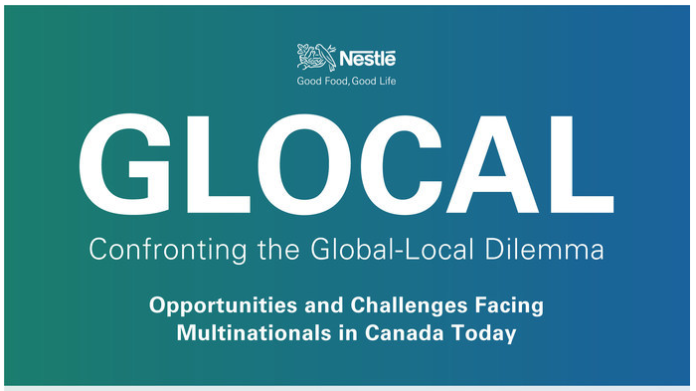Nestlé Canada today released findings from a first of its kind study examining Canadians’ perceptions toward multinational organizations. The data clearly shows that, while Canadians do have an appreciation of how multinationals contribute to the country, organizations are facing tougher demands and expectations when it comes to operating in local communities – with the pressure expected to increase as Canada experiences significant demographic shifts and population growth in the coming years.

“Surprisingly, there has been very little research done on how multinationals are viewed in Canada,” said Shelley Martin, President and CEO, Nestlé Canada. “We wanted to find out exactly what matters most to Canadians when engaging with large corporations, including ours. We hope this study will provide multinationals with insights that will help them leverage their global strengths for the benefit of Canadian communities – to become more effective ‘glocal’ organizations.”
For Nestlé, being a “glocal” company means having the size, scale and global expertise to offer Canadians the best products and services from around the world but delivering them with local people, in local factories, with local ingredients, and in a responsible, sustainable manner.

The research, conducted by Pollara, shows that Canadians view multinationals positively and believe they are contributing to the country’s social and economic fabric:
- Nearly all (94 per cent) Canadians surveyed believe it is possible for a large global company to act in local interests and most believe they do so more often than not;
- Both global and local companies are seen as providing economic support to Canada (67 per cent and 68 per cent, respectively); and
- More than 70 per cent of Canadians believe that multinationals champion research and innovation.
According to the study, Canadians place a premium on multinationals’ ability to provide superior products, with most believing that multinationals provide better, higher quality products at more competitive prices than local, smaller businesses.
Significant Reputational Barriers Remain
However, the study also found that multinationals face significant hurdles when it comes to being fully accepted by Canadians, with a majority feeling that multinationals need to do a better job of articulating how their values are aligned with consumer expectations.
Further:
- Eighty-three per cent of Canadians perceive multinationals as being more concerned with profit than anything else, as well as being impersonal (50 per cent) and bureaucratic (41 per cent); and
- Sixty-four per cent believe big businesses are too focused on the bottom line, whereas only eight per cent believe this to be true of smaller, local businesses.
“In Canada, and around the world, there’s a perception that it’s hard to like businesses once they grow beyond a certain size, despite how much they may contribute to the economy,” said Ms. Martin. “To overcome this, multinationals must focus on local relevance, be more transparent about where and how they profit, and clearly communicate how they are making a positive impact wherever they operate.”
Canada’s Diversity – Both a Challenge and an Opportunity
The study also found that Canada’s increasing diversity, while a strength, presents multinationals with a significant challenge. From distinct regional views to diverging preferences based on age, more work needs to be done today than in the past in order to satisfy the needs of a multitude of stakeholders.
From a regional perspective, the study found that:
- Ontario leads the country in the importance placed on the ability of multinationals to provide economic benefits to all of Canada (versus just one region);
- Quebecers are the least likely in the country to feel that multinationals are key drivers of employment. However, they are also the most likely to state that these same organizations provide quality products;
- Residents of Atlantic Canada feel particularly strongly that they would rather deal with a small local company; and
- Three-quarters of British Columbians have a positive view about multinationals.
When it comes to diversity among different age groups, Millennial respondents surprisingly view multinationals in a more favourable light than do their Boomer counterparts. Millennials are more likely than older Canadians to give global companies credit for:
- Providing community support (47 per cent and 36 per cent, respectively);
- Contributing to employment (68 per cent versus 58 per cent); and
- Developing products aimed at them/their family (58 per cent compared to 44 per cent).
Interestingly, Millennials are less likely than Boomers to see small local companies as entrepreneurial (49 per cent versus 64 per cent of boomers), people-oriented (54 per cent versus 70 per cent), innovative (22 per cent versus 41 per cent) or successful (10 per cent versus 24 per cent).
A Path Forward
Ms. Martin notes that the study’s data seem to indicate that multinationals in Canada are headed in the right direction but much still needs to be done to align perceptions with the reality that they are, in fact, contributing in a significant way to communities. To achieve this they must leverage all channels and technologies in order to effectively connect with an increasingly diverse group of stakeholders.
“We must be more proactive in our approach, communicating clearly on our purpose and values,” added Ms. Martin. “Multinationals have an opportunity to show our communities how our resources and perspectives as global entities compliments that of our local businesses, helping to enrich the lives of all stakeholders we touch.”


